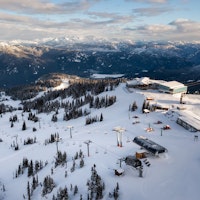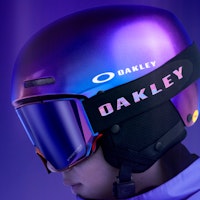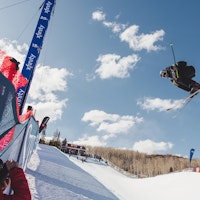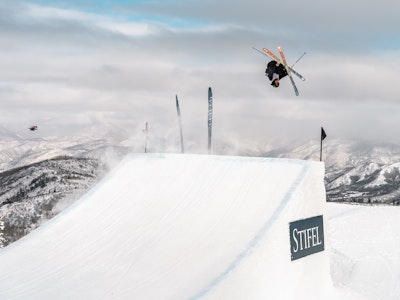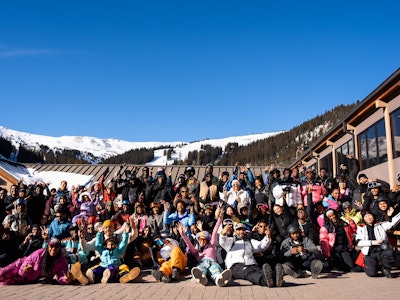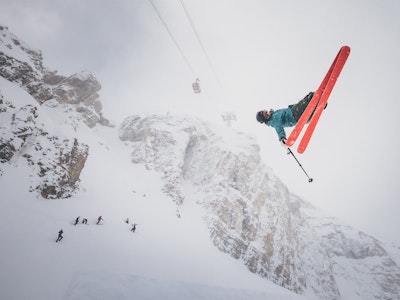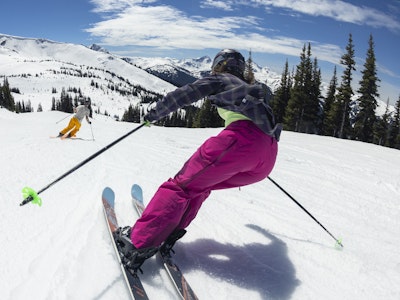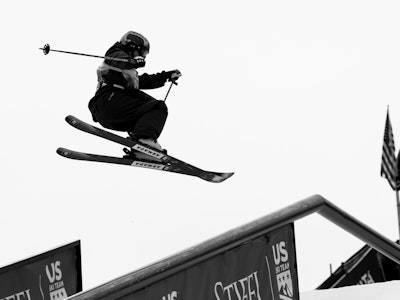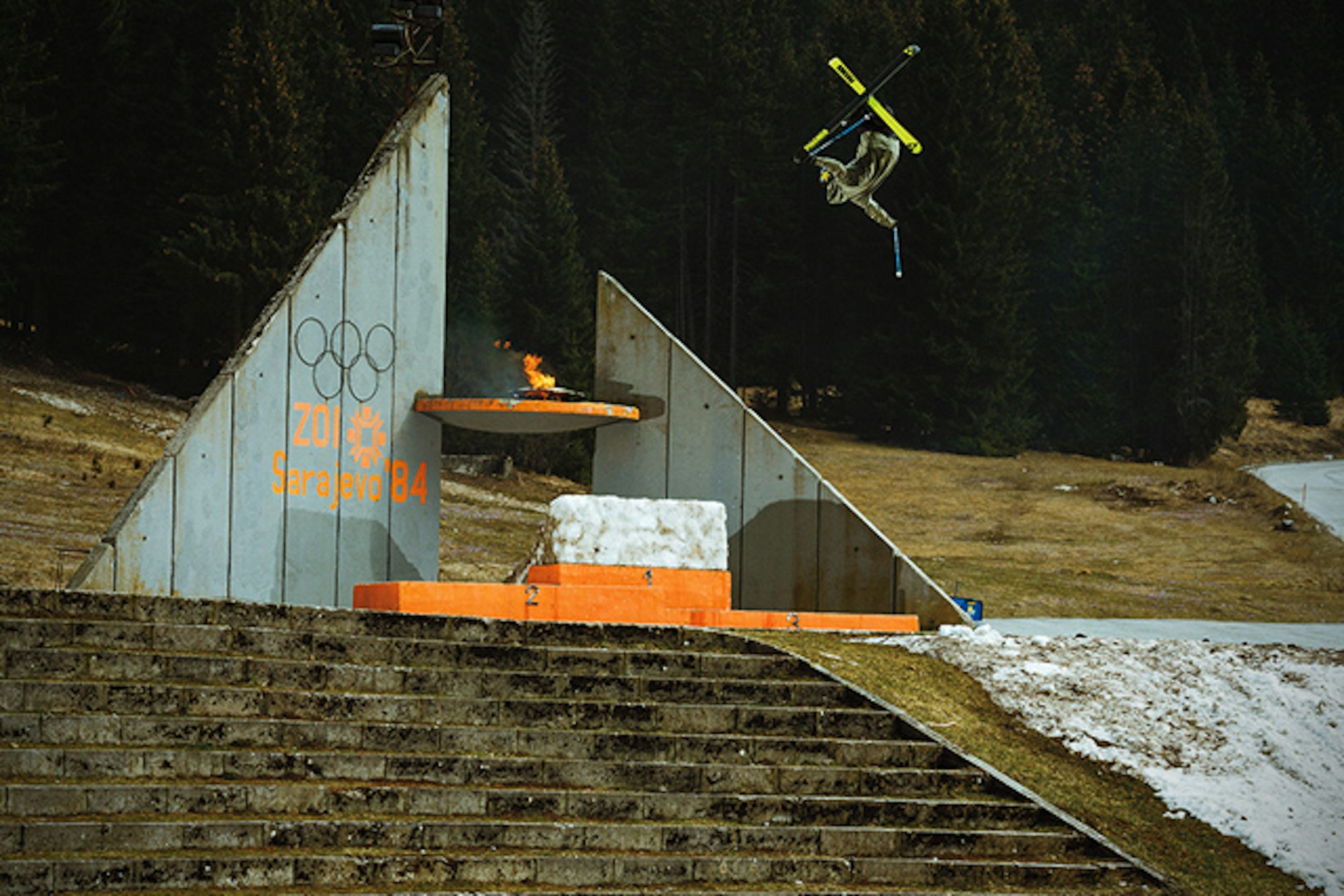[juicebox gallery_id=”137″]
The two most important characters in this story are not who you’d think. They don’t even include a skier. Not Karl Fostvedt, the skier behind last year’s iconic Detroit segment and the up-and-coming star of ski flicks from PBP to 4BI9, Sweetgrass and more. Not the Olympic slopestyle gold medalist, Joss Christensen, either. Nor does the duo include Chris Laker, who slays like both the other skiers by mixing contests and filming. And neither are these two characters a part of our film crew (Mike McLeod, AJ Dakoulas and Andrew Napier of 4BI9), who had been contracted by Teton Gravity Research to film the trip and put together a segment for the new movie Almost Ablaze.
The real stars of this trip to Sarajevo, Bosnia-Herzegovina, are locals, one from said city and one from Croatia but both living here. First up, our fixer, translator, guide, winch operator, car-tow driver and general savior. Dzoni Nixon, who we quickly dubbed Mahalo John (the easiest way to pronounce his real name is Johnny), was born in Sarajevo and works as an event car driver for Red Bull. Mahalo John has a wide face, framed by dark hair and a beard cut to the same short length. His energetic and athletic body contrasted with thoughtful silences throughout our trip. When the war broke out after the dissolution of Yugoslavia, the Sarajevo-born kid moved around like so many from there. “Over the next 10 years,” he recalls, “my ‘home’ was in Sweden, England, Germany, Serbia and Montenegro.” As a teen, living in Montenegro, he gravitated to extreme sports, eventually focusing on snowboarding and downhill mountain biking in opposite seasons. With a calm demeanor, he led us to the spots we wanted to ski, got the skiers into features with the right amount of speed, made sure we had food and drink, shepherded questioning locals away, got our broken car fixed and largely kept us from freaking out.
The Sarajevo segment from TGR’s Almost Ablaze, now available on iTunes
Eddie is our other hero. He lives with his wife, two young kids and stepmom in a small home just above the apartment we rented on a hillside overlooking central Sarajevo. We parked next to his house, in a driveway barely wide enough for one car that sloped 25 degrees and was shared by about eight households. Eddie, from the Croatian city of Split, has only skied once. I can’t explain why he’s so important without starting the story somewhere in the middle.
—
“Catastrophe!” Eddie said. “It sounded as a catastrophe.” He asked about our van and, understanding that Mahalo John was handling the aftermath, invited us for coffee on his patio. First, though, he needed to see if his neighbor had weed.
It was not yet 10 a.m. on the third day of a much-too-quick trip to Bosnia-Herzegovina. The driveway leading to our Airbnb crash pad was steeper than most of the runs we saw at ski areas around Sarajevo, and as McLeod shredded our van, in reverse, up through a 90-degree turn, the axle broke, sending a terrible sound echoing through the tight-knit structures on the hillside. Without transportation, our trip was doomed to failure, it seemed. Then Eddie ambled out with concern in his voice and a broad welcoming smile emerging from his scruffy beard.
“Tariq! Amerikanski!” explained Eddie to his toddler son about the circle of American skiers gathered around the table, balancing precariously in a small backyard carved from a slope behind his tiny home. Each armchair around the table touched another. Eddie had welcomed us and become our spirit guide. He’s no skier, he explained. His one attempt at two-planking came during the chase for a lady. She carved around while he back-seated his way down a Bosnian ski area without impressing her. By the story, he only took one run and never caught her.
He brought coffee, rolled cigarette after cigarette (40 cents apiece, he justified, for what would cost two bucks factory produced) and engaged in hours of conversation about Clinton, Obama, Miami, weed, Bush, Putin, his birthplace in Croatia and his new home of Sarajevo. Eddie had worked for Carnival Cruise Lines, based in Miami. His English was better than ours. He elucidated simply how the conflict in Ukraine would go down. “[Putin] can cut off the gas,” he informed us. “After that, it won’t matter if you have F-16s or super soldiers.” Later, as the politics and war unfolded this summer, I felt that someone on the inside had lectured us.
By afternoon we had a different van, with a transmission that worked, and proceeded to our next feature. After a few hours’ worth of digging, it was too dark for the video crew to shoot, but the skiers’ speed checks turned into straight airs and flashes. Sure, they were getting photos for this story, but greater inspiration also flowed from combining the nature of skiers who just want to ski with the moments we share with locals who don’t necessarily understand our sport. When our van made that disgusting sound, Eddie switched our situation from dire to remarkable. If skiing is about exploration as much as the act of sport, he has, on this down day, helped us discover the other side of the city.
—
The Sarajevo Winter Olympic Games (1984) were notable for Americans; as a nation, we earned five medals. Bill Johnson won gold in the downhill on the Bjelašnica course. The turmoil of his life, both before and after the Games, was echoed by what became of the host country over the same period. Phil and Steve Mahre took gold and silver, respectively, in slalom at the same venue. (Steve’s son Andy … well, we all know him.) Debbie Armstrong and Christin Cooper took gold and silver in the women’s giant slalom at Jahorina.
Bosnia-Herzegovina, is a confluence of ethnicities that remains from the dissolution of Yugoslavia and was nearly destroyed in the early 1990s. Before the country erupted in civil war, the Muslim majority and smaller Christian denominations seemed to blend in a modern and cosmopolitan culture focused around Sarajevo. Then came ethnic cleansing, minefields, snipers—the country saw it all. The UN and US talked, threatened, then, finally beginning in 1994, intervened with airstrikes. A few different locals praised President Clinton for his part in stopping the bloodshed and ending the 1,200-day blockade of Sarajevo.
Since returning from the trip, I’ve been binge watching documentaries and dramas of those crazy years. The films feature Richard Gere, Woody Harrelson and Angelina Jolie (directing rather than starring). My memories and opinions have grown. A war happened, and it was, without question, terrible. Ruined blocks of the city and pockmarked walls remain. Even the Olympic ski jumping venue, called Igman, has its iconic podium that, when you search online, was at one time filled with bullet holes. The judging tower on the jumping hill still bears a painted “UN.”
While we were building a jump over the podium, we ran into a group of peacekeeping military men from Hungary, who were ambivalent about the piles of snow we’d dumped on the takeoff and landing. We introduced the gold medalist, Joss, and they mostly seemed interested in making sure the magazines of their huge machine guns were in proper position to look authentic in the photos we took.
When our day of shoveling snow was done, Mahalo John stood atop the Olympic torch, probably unlit in thirty years, while the ski jumps of ’84 looked down silently from the hill above. We had filled the torch with T-shirts soaked in kerosene, and Dzoni held a lighter. “Do you know what this means for us?” he asked. I thought of Joss and the thirty years that will follow freeskiing’s entrance into the Olympics, and I couldn’t come up with an answer. The flames leapt up and before Karl, Laker and Joss had hit our jump five times, the flames were out of control. The guys landed a 360 Cuban grab, a nine blunt and a dub misty 1080, but we had to put out the flame to avoid further damage to the monument, which up close is marked by a patchwork of filled bullet holes.
Although flying into Sarajevo showed terrain laid bare of snow, a short 45-minute drive from our apartment put us deep in the mountains. Around our first objective—a hotel that hosted Olympic athletes three decades prior—we didn’t see any snow. Bjelašnica, with white ribbons marking its runs, rose to the south as the only obvious marker of our sport. During the dissolution of Yugoslavia, the hotel had been the site of gunfights and death. In the 20 years since the war, it had simply fallen apart.
Our guide led us to an abandoned stretch of road less than a mile from the hotel, and we were warned not to sneak off into the trees—landmines were a common and deadly part of the war (over a million mines were laid across some 18,000 registered minefields and beyond). A bright orange truck rolled up with a shark-jawed scoop and two tons of snow. This was our trip’s fake UN Charter. Anyplace we wanted the white stuff, a couple hundred bucks would deliver this beast and its snowy loads for our skiing pleasure.
Later in the evening, surrounded by the angular skeleton of this former hotel, a sweaty Karl Fostvedt threw himself at a concrete wall, spun, grinded, skied away. A winch made choking accelerating sounds before spinning off in the echoes of the concrete. A flash popped.
As the light died over Sarajevo, we sat on our deck. The experience was confusing like the first time you went to a theater with surround sound. From every direction rang the immediate and echoing sounds of the call to prayer. On each minaret, lights sparkled against the deep blue sky, speakers rang the sounds of piety that signaled Salat—the practice of ritualistic prayer. Of course, I turned my face to my phone and Googled to learn about the meaning of the moment on my own. After snapping a few photos, I gave in to leaning against the wall and observing.
Long after dark, after showers and empty-stomached couch lounging, we made our way to a decidedly un-American pizza joint where $3 gets you a Big-Gulp-sized beer and a homemade, fresh-cooked pizza. The restaurant we would return to night after night was almost impossible to find, tucked in a dead-end 8-foot-wide alley, off of a pedestrian mall.
As we serpentined the streets on the first night, a postcard with an illustrated wolf on the front—inside one of the stores filled with knickknacks—caught my eye. I knew that animal and its scarf, because I had owned a small statue of the same figure. Before hopping on my flight to Sarajevo, I called my grandmother who reminded me that she had visited the city as a spectator during the 1984 Olympics. “Think of me while you’re there,” she requested. She knew I’d recently been in Russia, and I had explained how the echoes of ’84 meant something to me, two weeks removed from visiting Sochi. My grandparents had brought me back a statue, “Vucko,” the Olympic mascot, a wolf adorned with a jaunty scarf. He traveled with me for years, and suddenly I longed for this inch-tall statue that was probably lost amid one of my moves from town to town to city. My grandmother remembers a dry winter in 1984, hardly befitting a Winter Olympics, before heavy snowfall threatened to lock them in place. During our stay, we could only hope for such a blizzard. It never came.
Today, the 1984 Olympics still anchor the residents’ pride. There is no forgetting what happened between then and now. But for all the obvious scars, there is something else. We crossed paths with a man at Igman who didn’t speak much English, but as soon as the word “Olympics” crossed our tongues, a card came from his wallet. It was not fat with credit cards or cash, but it held something important to him. He pulled out his identification card from the 1984 Olympics. A younger face balanced next to his current visage: it was his official Olympic worker ID card. He stood for photos with a beaming, if confused, smile—his memory held steady.
Igman only hosted one event. The venues in Sochi may well have a similar fate. How does the Sochi of 2014 fit into history? There is no way of knowing until someone writes those books. And Sochi will always be known as the host of the 2014 Games, no matter the destiny of the expensive and probably forgotten venues. Wherever you find yourself, locals will always have their stories. Years nor wear, happiness nor tears won’t change that. The smiling face on an ID card will still be there even as surrounding layers of life are creased with smiles or frowns.
—
“Utah?!” said the attendant at a middle-of-nowhere gas station atop a hill outside of the city. “Even worse than Bosnia.” AJ Dakoulas of 4BI9 stared back with a blank face. Somehow, the horror that fills the history of Sarajevo means that many people we crossed paths with were world wise. Many had spent years abroad, either as refugees who fled the un-civil war-siege of Sarajevo or later chasing money far from the ravaged economy that followed the war.
Google “Sarajevo movies,” like I’ve been doing, and you’ll find many examples that, through Hollywood’s stupid filter, show the beauty and cosmopolitan nature of the city. Each flick contrasts alcoholic American journalists (always marinating at the downtown Holiday Inn) and the unwavering terror of Sarajevo neighbors killing neighbors within the city. The story of this city is fascinating and many of the movies are tremendous, even if, as most movies are, they’re a measure below the reality.
The people of Sarajevo know war and hardship. Their cynicism is realism built on experience, but it doesn’t manifest in stoicism. Rather, we saw a populace taking joy from a sunny day with smiling faces tilted to the sky. “Who would’ve thought you’d catch a tan in Bosnia?” joked Dakoulas. The weather during our trip, sunny and cloudless save for one perfectly timed rainy rest day, contributed to our bronzed skin and my good memories. The people of Sarajevo, though, really make it the most Mahalo city in all of Eastern Europe, to borrow the 4BI9 catchphrase.
—
At some point, I’ll return to Sarajevo—not to wake up early and shovel snow ’til late I hope. Perhaps no one would recommend dragging your skis to Bosnia, for what amounts to skiing comparable to the bottom third of Rocky Mountain resorts. On the other hand, as I looked up at the consistently steep, wide runs, I thought that these would be perfect mountains for cranking turns on rental equipment, jeans rolled over boots. I imagine the next day spent lounging with a coffee and watching the world go by, diverse and unhinged by what television feeds us. The flights from North America are easy, after that you can enjoy a $100-a-night apartment and stroll to the street-side fruit stand for breakfast before driving off towards the Adriatic coast for a day on the beach.
I’ll be back to wander the narrow streets. To explore this place so I can meet more of its inhabitants and learn about the places they live, to contemplate the past and to think about the future, to discuss art and politics as the sun goes low in the western sky, with a beer on the table in front of me. Maybe I’ll be there when the ski resorts that hosted the ’84 Games are open, and I will make turns down wide-open runs and ride empty lifts. Maybe I’ll go to Croatia and swim in the clear waters that rest below limestone cliffs. Skiing has brought me here and allowed me these possibilities.
If you have a few ducats sitting around, go. There’s no need to drag snow to the podium and throw a 900, a simple selfie will do. It’s the perfect companion to the words you share with the people you love.
—
At each stop of our ski tour around Sarajevo, we saw monuments to the 30 years since the Olympics. Almost every square of grass inside the city limit is speckled with headstones. Apartment buildings are riddled by the bullets of neighbors, only smoothed by patches within easy reach, 20 feet up from the ground on a ladder or within five feet of a leaning body.
The final feature of our trip was a long down rail next to an ornate house. Below was the spread of a beautiful city without any flat ground and the airport that had, for a few years, a tunnel under its runways that marked the divide between freedom and death. Above us was an endless cemetery, the headstones loomed as I watched Karl jump fearlessly down the rail, swap his leading foot and skid out on asphalt covered in only a thin trickle of water from the pile of snow trucked in from the mountains.
While we built a landing for a roof drop at Jahorina the evening before, a Bosnian in a black Adidas tracksuit had approached us. “You are building a ramp?” he asked. As he wandered off after a quick, curious conversation, he wished us well, “Good luck. How do you say? Break a leg!” He paused and, with a nod, summed up the reality of his town, “But not your neck.”
—
Note: This article appears in FREESKIER magazine Volume 17.2. The issue is now available via iTunes Newsstand. Subscribe to FREESKIER magazine. Almost Ablaze is now available on iTunes; get it here. You can also catch the flick at a tour stop near you.

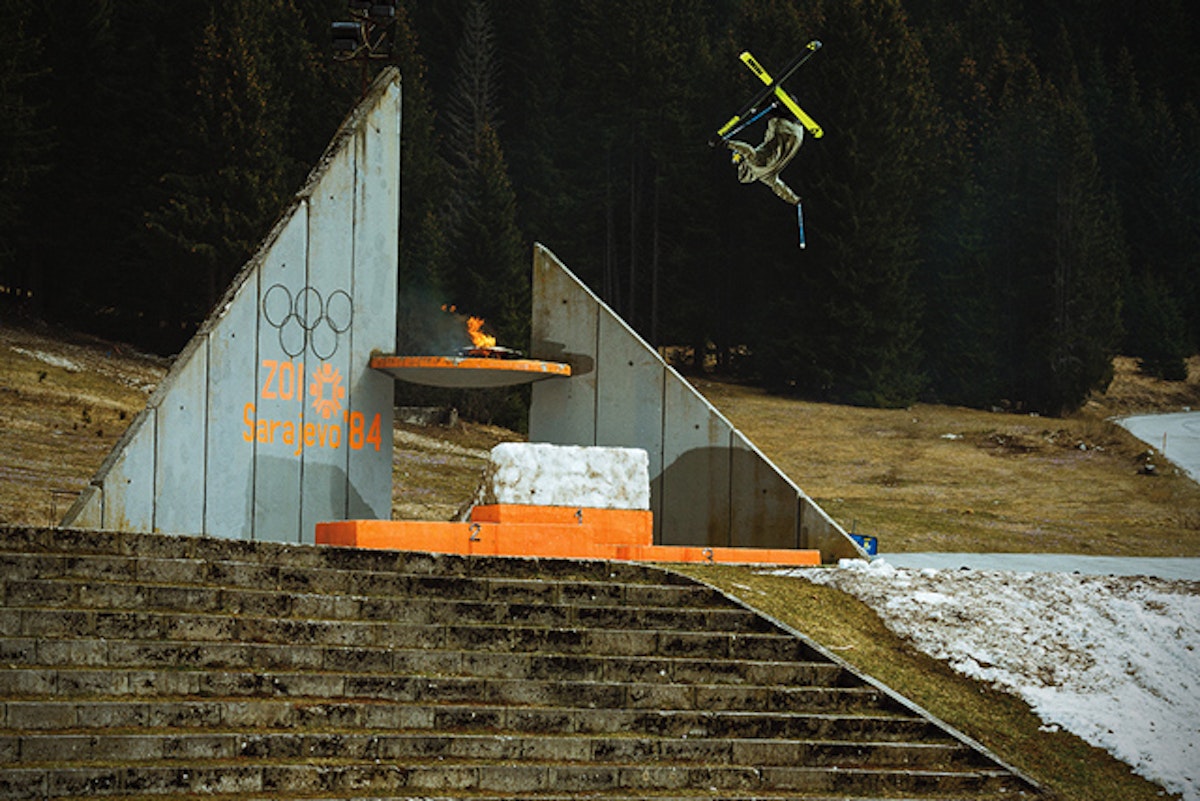
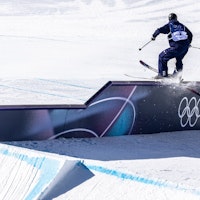
![[GIVEAWAY] Win Nordica's All-New Unleashed 106](https://www.datocms-assets.com/163516/1770321616-nordica.webp?w=200&h=200&fit=crop)
